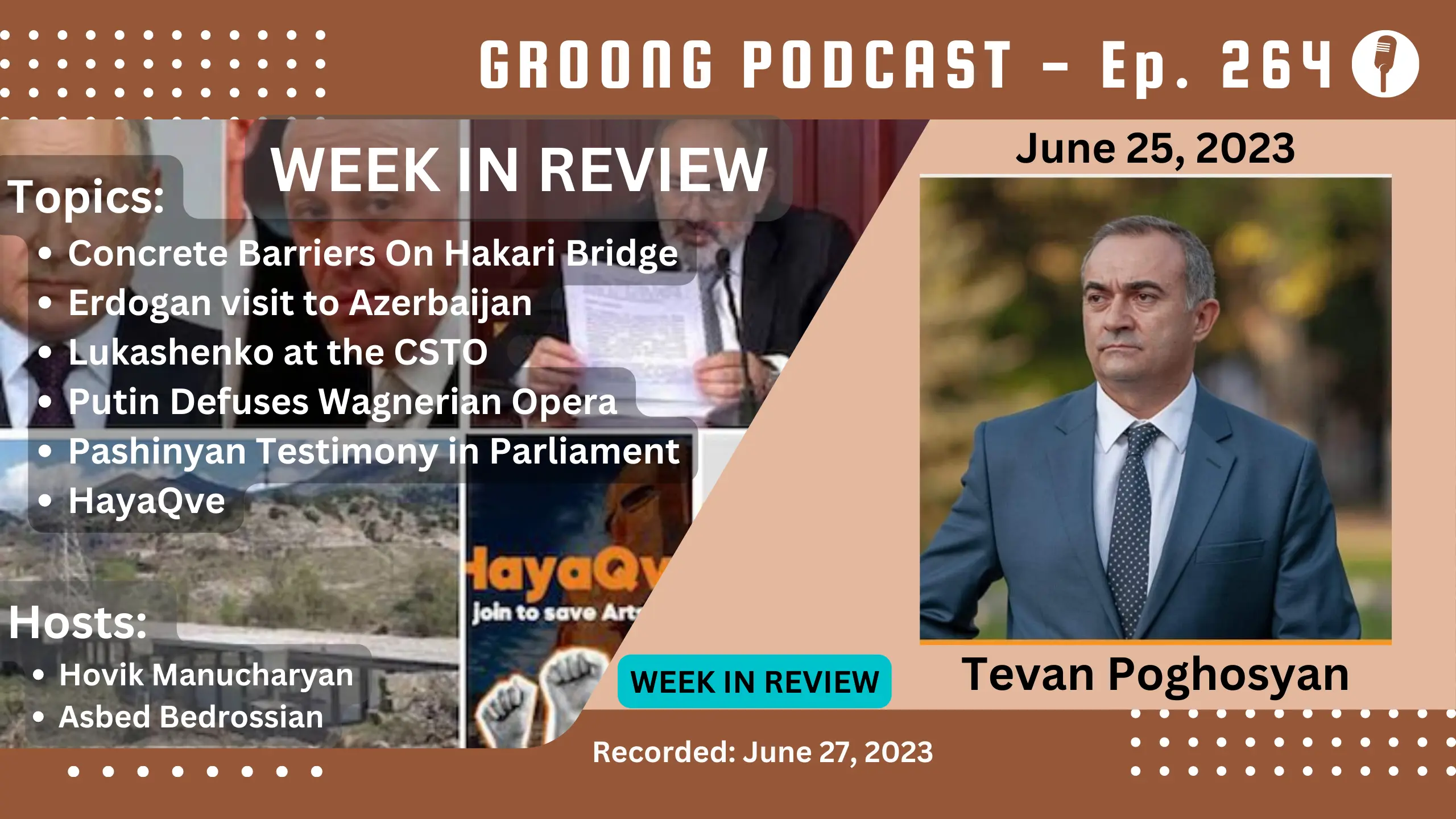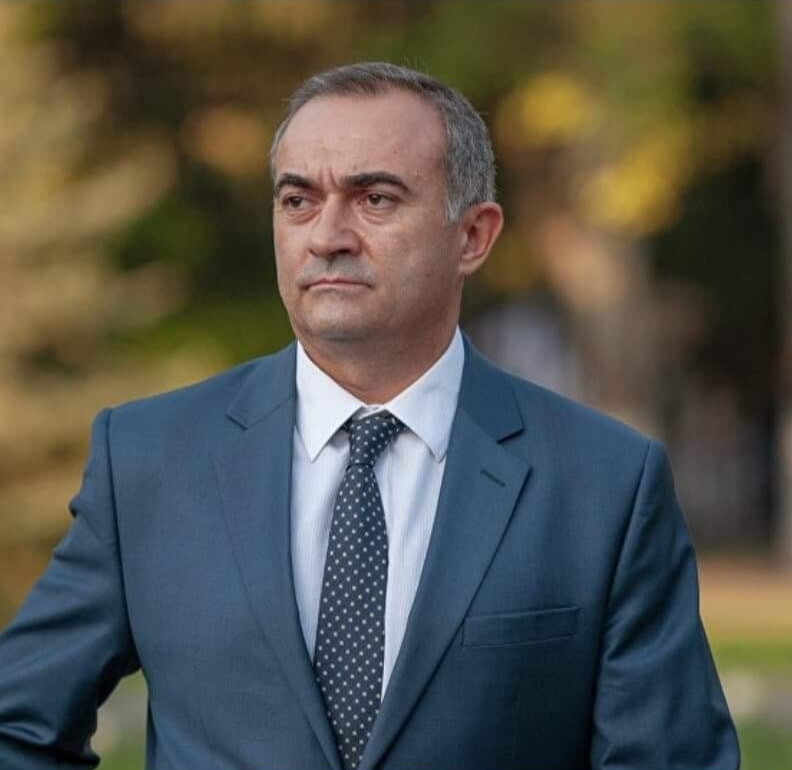
Guest:
Topics:
- Concrete Barriers On Hakari Bridge
- Erdogan visit to Azerbaijan
- Lukashenko at the CSTO
- Putin Defuses Wagnerian Opera
- Pashinyan 44-Day War Testimony in Parliament
- HayaQve [.am]
Episode 264 | Recorded: June 27, 2023
Show Notes
Concrete Barricades on Kashatagh Corridor
The Kashatagh/Lachin corridor, the only way to send supplies between Armenia and Artsakh, was sealed tight by Azerbaijan after an incident on the Hakari bridge on June 15. For more than 12 days now, Artsakh remains completely isolated, even Russian peacekeepers in Artsakh can’t bring in supplies. Over the last few days, we received reports that now some food is being flown in on Russian helicopters, but it is clear that this can’t be at the June 15 levels, let alone December 11, 2022 levels.
Why?
How did the existing dire situation become even more critical?
One June 15, Armenia shot at Azerbaijanis trying to plant a flag on the side of the Hakari bridge that is closest to Armenia. The Armenian MFA later explained that demarcation and delimitation was not done and appeared to claim that the spot the Azerbaijanis were trying to plant the flag was disputed or Armenian.
Azerbaijan used this as a pretext to completely close the corridor, even for Russian peacekeepers and the Red Cross. To make their point, the Azerbaijani regime installed concrete barriers on the bridge. To this day, it seems that even the restricted pre-June 15 level of supplies and traffic – which consisted mostly of humanitarian aid delivered by Red Cross and the peacekeepers as well as the evacuation and repatriation of seriously sick people – has not been restored. Two days ago, a 1 year old with serious health issues was flown to Armenia by Russian peacekeeper helicopters.
Pashinyan says he accepts 1975 maps. Those 1975 maps that we’ve looked at show that segment of the Hakari river, and therefore any bridge on it, would be in Armenia. Essentially the 1975 maps are the latest maps that are officially delimited and demarcated between Armenia and Azerbaijan.
Question:
- Was fighting for that portion of the bridge worth the outcome, its several meters of bridge?
International Inaction Or Even Worse?
We often complain about international inaction on Artsakh, but is it possible that there could be even a worse reaction? Recently, towards the end of May, Aliyev demanded that Armenians of Artsakh must come to Baku and surrender, ask for forgiveness and start talks on how to “re-integrate”. Only then will “the sultan of Baku’’ consider amnesty for them. The US State Department ignored all the rest of the speech, filled with threats from beginning to end, and only focused on the “amnesty” part, welcoming Aliyev’s so-called “amnesty offer”.
Why is this important? Because it is being widely reported that the US, which previously appeared to be uninterested in injecting itself into the discussions on the status of Artsakh, is now seeking a mediator role between Baku and Stepanakert. This wasn’t received well by Russia where the foreign ministry spokeswoman, Maria Zakharova, stated that the US is trying to force itself into the “discussions” process with Baku. Russian media carried reports that the US was threatening Armenians of Artsakh with military action from Baku should they not accept this offer.
Questions:
- What is the US agenda?
- Does the US want to mediate between Baku and Stepanakert?
- Can it even take on such a role? Would the US be willing for instance to replace the Russian peacekeepers.
Erdogan Visit to Azerbaijan
Two weeks ago newly elected Turkish president Erdogan paid the first visit of his third term in office to Azerbaijan. In a sense the message he sent to Armenia is that Turk business as usual will continue, and get tougher. For example he mentioned that Turkey will establish a consulate in Shushi; this is not the most accessible or centrally located site in Azerbaijan, but it’s a total “in your face” to Armenia.
Erdogan also shuffled his entire cabinet after his election. His Intel chief, Hakan Fidan, is now his foreign minister; and his former presidential spox Ibrahim Kalin is now his Intel chief, Both accompanied him to Azerbaijan. Fidan is an ethnic Kurd, and his doctoral thesis had to do with the “Armenian question”. These are people who have had a certain lifelong “passion” dealing with Armenians and Turkey’s obsession with Genocide denial.
With all this in recent background, Ruben Rubinian, special rep to the Turkish-Armenian “normalization” process, again talked about Armenia completing work on the Margara bridge, and his hopes to open the Turkish-Armenian border.
Questions:
- What are the realistic expectations from this so-called “Normalization” process? Is the government deluded in thinking there’s something in it for Armenia in this process with Turkey?
- What will be Erdogan’s major, international priorities, given the current world geopolitical landscape of the war in Ukraine, his strained relations with the US, and the line he’s walking between the west and Russia?
Lukashenko At the CSTO
Last week there was a meeting of foreign ministers of the CSTO in Minsk. Belarus president Alexander Lukashenko addressed the FMs, and in one comment he noted that the gripes against the CSTO by member countries such as Armenia and Tajikistan are justified.
The history of CSTO-Armenia relations of the past year has been full of acrimony on the part of Armenia and a lot of nothing on the part of the CSTO. As Lukashenko is a close ally of Putin, the comment was a bit of a surprise.
Questions:
- Has the press overanalyzed a passing comment by Lukashenko, or are there hints of a shifting strategy on the part of Russia (mostly) and Belarus?
- How should Armenia respond to this?
- Does Russia have enough resources and attention span at present to deal with Armenia’s problems in the South Caucasus?
Putin Defuses Wagnerian Opera
By far the most riveting international development in the past few days has been the attempted mutiny by former Putin ally Yevgeny Prigozhin’s “Wagner Group” private army. The west has been salivating for a coup by Prigozhin, as he accused Russia’s defense leadership of inertia and incompetence and bungling the war in Ukraine.
Anyway, within 24-48 hours Putin managed to defuse the entire affair. Probably significant credit goes to Belarus president Lukashenko, who managed a deal with Prigozhin to avert a very serious domestic instability in Russia.
Questions:
- What was your read of these events in Russia?
- Is it over?
- How can such instability in Russia affect Armenia and the South Caucasus in general?
Pashinyan Gives 44-Day War Testimony in Parliament
Last week, Pashinyan was in parliament and gave testimony on the 44-day war to a select, all-Civil Contract war commission. It sounded like a well-rehearsed deposition that his lawyers had gone through, for a well-fitted narrative that pointed fingers at the military, and allies, for all failures in the war.
Questions:
- Can an all-ruling party war commission yield truthful findings on a war it lost?
- Why isn’t the Opposition participating in these proceedings?
- Has parliamentary supermajority undermined Armenia’s democracy?
Haya-Qve
Learn more:
Given that Nikol Pashinyan has absolute supermajority in the Armenian parliament through his ruling Civil Contract party, any opposition effort in the past to make legislative changes has been met with a concrete wall formed by Civil Contract parliamentarians voting in unison to the last member.
Now a group of citizens led by some well-known names, such as Avetik Chalabyan from the Hamakhmbum movement, are introducing a citizen-initiated effort to amend the Armenian law, through referendum if necessary. The effort will criminalize recognition of Artsakh as part of Azerbaijan and denial or diminishing the significance of the Armenian Genocide.
The process is as follows:
- Upon collection of 50,000 signatures, the measure will go to the Armenian parliamentary agenda, however, Civil Contract can simply veto the measure.
- If the measure is not successful, an additional 300,000 signatures must be collected, after which the issue will go to referendum.
The process is currently in the 50K signature phase and the movement has complained that while the CEC (led by a Pashinyan loyalist) has approved the measure, various municipalities are obstructing the effort by refusing to provide facilities for signature collection.
Questions:
- Why is it important to sign?
- Who can sign?
Topics from the Panelists
- Hovik: Why did Pashinyan gov decide to shoot at the Hakari bridge?
- Tevan: Artsakh blockaded for 197 days, a shame on our nation
Wrap-up
We hope you found our Week in Review helpful. We invite your feedback and your suggestions. You can find us on most social media and podcast platforms. Thanks to Laura Osborn for the music on our podcasts.
Guests

Tevan Poghosyan
Tevan Poghosyan is president of the International Center for Human Development. Mr. Poghosyan was an MP in the National Assembly between 2012 and 2017 from the Heritage party. From 1997 to 1999 he served as the Nagorno-Karabakh Public Affairs Office Director in Washington, D.C.
Hosts

Hovik Manucharyan
Hovik Manucharyan is an information security engineer who moved from Seattle to Armenia in 2022. He co-founded the ANN/Groong podcast in 2020 and has been a contributor to Groong News since the late 1990s.
Disclaimer: The views expressed by Hovik Manucharyan on the ANN/Groong podcast are his own and do not necessarily reflect the opinions of his employer or any other organization.

Asbed Bedrossian
Asbed is founder of the Armenian News Network Groong and co-founder of the ANN/Groong podcast.